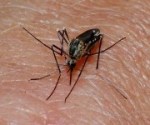 Floridians don’t like dengue fever. No one does: it’s a painful ailment spread by mosquitoes that results in skin rash, achiness, sometimes a little bit of death. Oxitec, a biotechnology firm based in the U.K., has a possible solution: mosquitoes engineered to die before they can spread the disease.
Floridians don’t like dengue fever. No one does: it’s a painful ailment spread by mosquitoes that results in skin rash, achiness, sometimes a little bit of death. Oxitec, a biotechnology firm based in the U.K., has a possible solution: mosquitoes engineered to die before they can spread the disease.
Turns out that Floridians don’t particularly care for bioengineered mosquitoes, either. From Nature:
[I]t took only three months for Mila de Mier to gather 100,000 names from people opposed to the release of the mosquitoes in Key West, Florida, where the potentially lethal disease is making a comeback. …
“The more questions we ask, the more confused we are,” says de Mier, a Key West business woman, who started the petition in April. “I started thinking, ‘Oh my goodness, what if these mosquitoes bite my boys or my dogs? What will they do to the ecosystem?’.”
The good news for de Mier’s boys and dogs is that Oxitec’s mosquitoes are all male and therefore don’t bite. They live short lives mating with the native population, passing on the self-destruct gene. In field tests conducted in Brazil, introduction of Oxitec’s mosquitoes dropped the population in a small area by 85 percent in one year. That could make a difference against a disease that’s already established a foothold. A 2010 study found that 5 percent of Key West residents already carry the virus. The existing method used to stem transmission, as The New Yorker notes, is to dump insecticide over wide swaths of the area.
Short of moving (might we suggest Southern California? It has none of the tropical climate and all of the access to Disney), residents of Key West are left with this choice: suffer from the effects of dengue fever, expose large portions of the population to insecticide, or release genetically modified mosquitoes.
Click the play button below and leave your answer in the comments.



